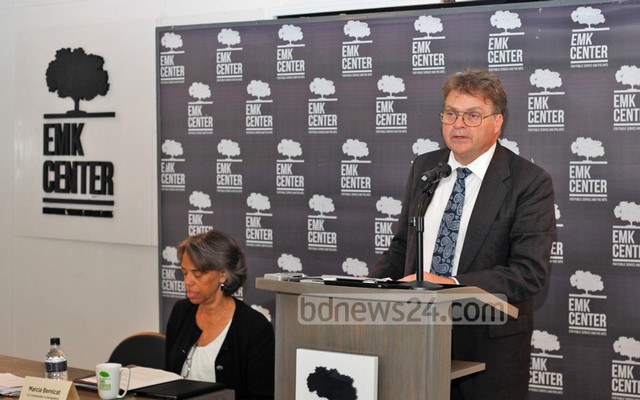The government may claim it has fulfilled the 16-point action plan Washington rolled out two years back, but Bangladesh appears a long way off getting back preferential trade benefits in the US market under GSP facility.
Visiting Assistant US Trade Representative for South and Central Asia Michael Delaney, and US Ambassador in Dhaka Marcia Bernicat on Wednesdaymade it clear that Bangladesh, in fact, did not implement those conditions.
There was an assessment by “some” in Bangladesh that the action plan had already been fulfilled, Delaney said. “But the fact is that our own tracking of the items in the plan indicates that more needs to be done.”
Ambassador Bernicat before Delaney’s speech said completing the action plan was “the right way forward and right thing to do”.
She said there were some “inherent” international standards in action plans that needed to be fulfilled.
The visiting US official was speaking at the Edward M Kennedy (EMK) Centre in Dhaka before a select group of audience mostly journalists at the end of his five-day Dhaka visit.
The ambassador introduced him as an assistant secretary who brought with him “decades of experience” on trade issues as well as Bangladesh.
His visit was initially seen as part of the GSP decision-making since just before his arrival, the government had issued the implementing rules of the revised labour law, which it said was the last condition of the action plan.

File Photo
But the assistant secretary said he came here to gather information on the clothing sector, and prepare for the November meeting in Dhaka on the sustainability compact, which the European Union rolled out after the worst-ever factory disaster in April, 2013.The Rana Plaza factory collapse that killed more than 1,100 people was believed to be the only case that influenced the Obama administration’s decision to suspend the GSP privilege in June 2013.
Under the GSP, 5,000 types of Bangladeshi goods enjoyed duty-free access but the multi-billion dollar readymade garment export was not included.
But the assistant secretary said the decision, which sent negative image across the world about Bangladesh’s factory safety and labour rights standards, was based on six years of review and engagements with the government here.
Commerce Minister Tofail Ahmed has been maintaining that this GSP decision was political, after Washington did not include Bangladesh in its updated list of eligible countries for GSP facility last August.
Delaney said the criteria to suspend GSP were “transparent” and applied “equally to all countries”.
He said the action plan was also formulated after discussion with the government to identify the needs, and it demonstrated “our commitment to partner with Bangladesh to address those issues”.
He, however, said the timeline for getting back the GSP facility depends on Bangladesh.
“There has been a concrete improvement regarding workers safety. However, there are other elements of the action plan that must be addressed…
“Such as freedom of association, greater transparency with respect to unfair labour practices, and union registration both outsides and inside the EPZs.
“These are the areas where improvements must be made in order to fulfil the action plan,” he said.
Ambassador Bernicat said they invested $12 million in Bangladesh to improve the labour conditions.
Through the USAID, she said, another $22 million would be invested soon to give loan guarantee to manufacturers so that they can make necessary safety improvements in their factories.
The US has conducted three separate reviews since June 2013 of Bangladesh’s progress on the action plan.
Source: bdnews24










